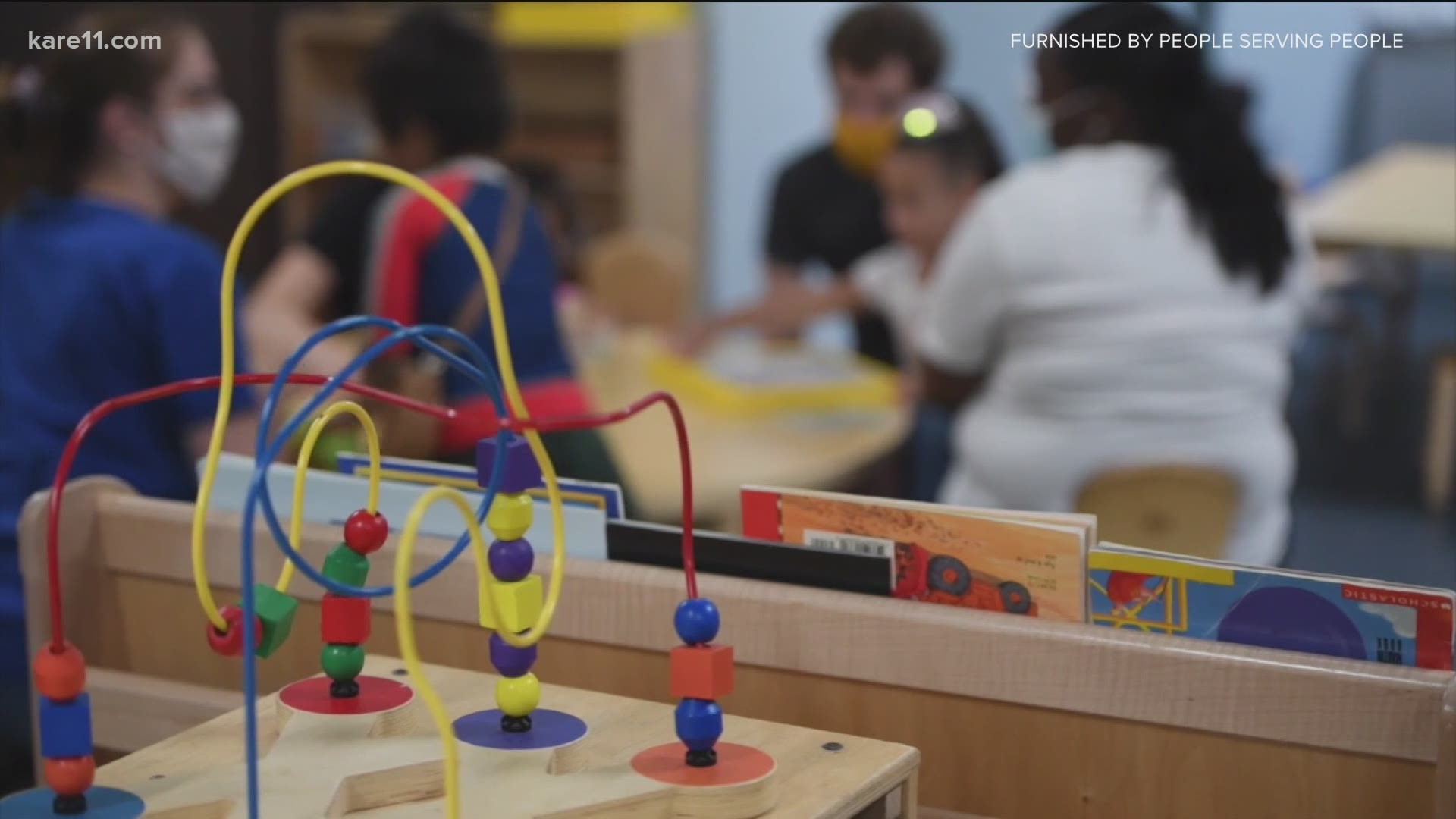MINNEAPOLIS — The closure of schools due to COVID-19 has been disruptive and painful for many families, but imagine trying to focus on the demands of distance learning from a shelter or hotel room.
For children experiencing homelessness—an estimated 1.5 million kids nationwide—the effects are devastating for those families who no longer have a home or school.
It’s why People Serving People, the region’s largest emergency shelter for families experiencing homelessness, opened a new classroom within its shelter this fall, specifically dedicated to helping children staying at the shelter with distance learning needs. The classroom can support up to 10 kids each day.
The added trauma from COVID-19 is top of mind for the Blake Ward, People Serving People’s Director of Education, knowing many families don’t have the physical space or emotional bandwidth, and sometimes have to choose between school or survival.
“This is just a really hard time for everyone. Particularly if you're facing a lot of trauma and stress. It's hard to focus and be a full-time teacher, parents, and also deal with those things. Some families just needed to be able to go and go to a job, you know, in the can't monitor, you know, the children's learning on site,” said Ward. “How do you balance life as an adult and not having any breaks away from your children, which is just really important for adults’ mental health, as well as the kids’ mental health?”
Megan Collins is one of the teachers within the new classroom at People Serving People and will always remember a third grader’s recent reaction when her online peers asked her where she was logging on from each day.
“She paused the video and looked at me, and she's like, ‘I don't want to tell them I'm at a homeless shelter, obviously.’ And it's really sad that she felt like some shame of being at a shelter already at that age. School is hard for them already. And then to just add this on to it, it's really hard for them,” said Collins. “We talk a lot about ‘this is hard, but we can do hard things,’” said Collins.
In 2020, People Serving People has served an average of 71 families at any given time with the average stay around 47 days. In total, the organization housed an estimated 1,700 children last year. Families enter the experience of homelessness through multiple avenues, with the lack of affordable housing and wage stagnation, inaccessible and affordable childcare and early education. Inaccessible chemical and mental healthcare, along gender and community-based violence are also factors.
People Serving People points to persistent racial disparities that and structural racism as a cause of family homelessness. Black and American Indian families are overrepresented among families that experience homelessness.
Meryt Watkins-Wright and Hawie Birhanu are teachers at People Serving People’s Center for Excellence, which helps families transition out of the shelter. They also execute distance learning for a handful of kids each day and focus on positive reinforcement and building resilience.
“Just focusing, it's really hard in general for them. I would say motivation is definitely way down for our students. So, I really like to make sure that the kids know how proud of them I am,” said Watkins-Wright.
Watkins-Wright is gravely concerned for the thousands of kids who don’t have access to centers like the classrooms set up at People Serving People, or any other safety net that prevents students from falling behind.
“After all of this is over, I think that we are going to have to be really very kind and considerate of the fact of what all of these kids have been going through. And I think that a lot of kids are going to be behind and we will have to kindly deal with that. I think that they're doing their best. They're doing their best, and the best thing that we can do is support them,” Watkins-Wright added.
Co-teacher Hawie Birhanu said the educators make it a point to tell each child they are loved each day.
“We tell them that we love them all of the time, to acknowledge that they are just kids and that they're struggling. Our job is to help every day by making it a little bit better for them,” said Birhanu.
Families seeking shelter at People Serving People can call First Call for Help at (651) 291-0211.
Hennepin County is currently accepting applications for emergency housing assistance until Friday, December 11. Rent help is available for who have been financially harmed by COVID-19 and may qualify for emergency assistance to help with rent and utility costs.
Minneapolis Mayor Jacob Frey announced this month that the Stable Homes, Stable Schools program is now a permanent resource, offering rent assistance and emergency resources to families of elementary age students experiencing homelessness. It started as a pilot program and is now a sustaining partnership between the city, housing authority, county, and the public schools.

